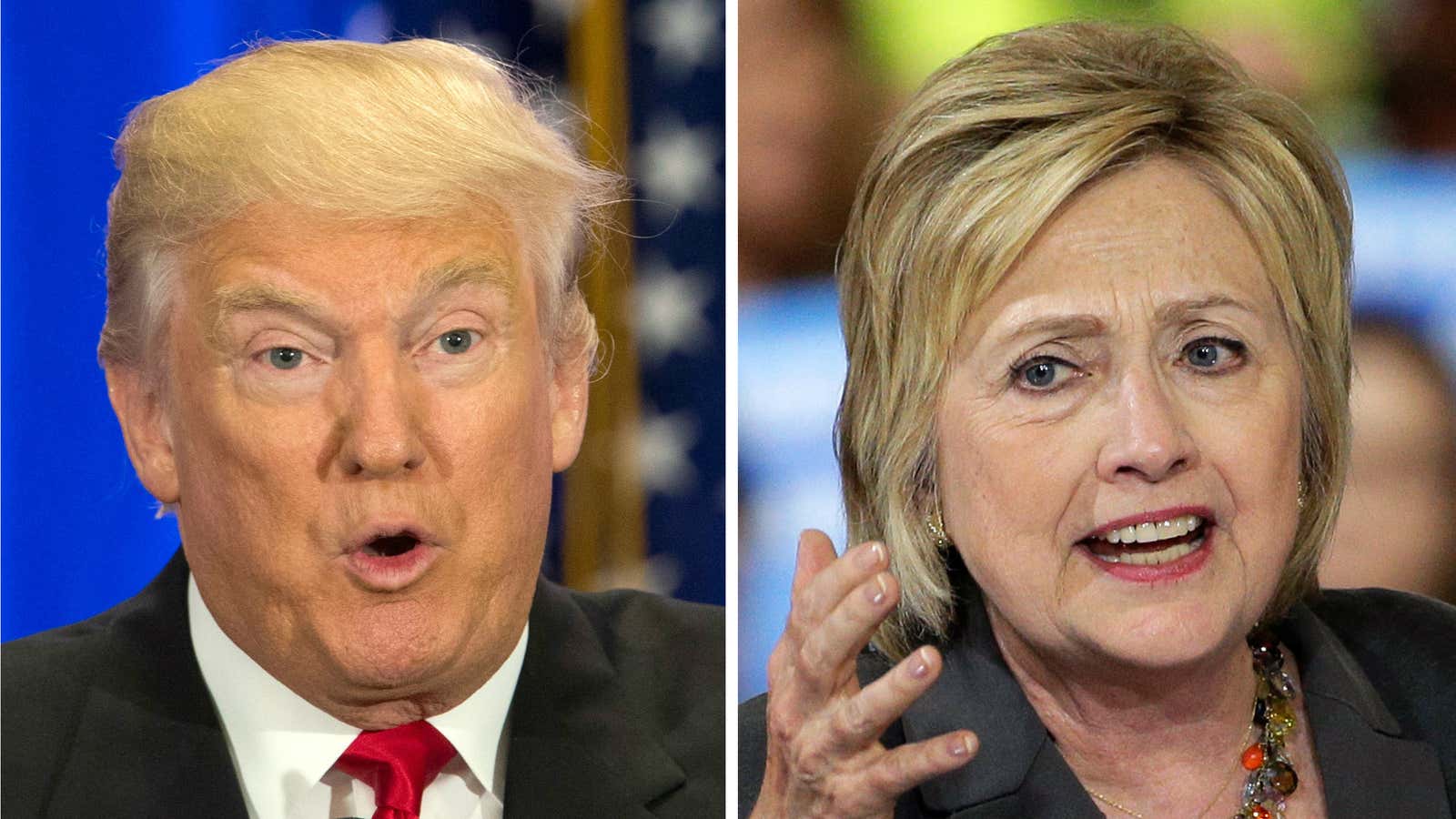Though you wouldn’t know it from the media hype, most political scientists think presidential debates usually have little influence on the election outcome, regardless of what people tell the pollsters.
But surely this election year is different. Indeed, a new poll reports that 34% of registered voters say that the debates will be critical in helping them decide whom they’ll vote for, according to the Wall Street Journal (paywall), which conducted the poll with NBC News.
That sure sounds like an awful lot is on the line tonight (Sep. 26) when Donald Trump and Hillary Clinton take the stage for their first debate. It’s not just about landing punches and satisfying supporters—there are swaths of undecided voters up for grabs, and performing well in the debates could offer the chance to clinch them.
But wait. In the penultimate sentence of the WSJ article, 20 paragraphs deep, is some important context: the same datapoint from past elections.
However weird this election year might feel, it doesn’t seem to be at all atypical, at least according to this poll. And though it seems illuminating that around a third of voters generally say the debates do matter, we don’t know exactly how, as the WSJ/NBC poll didn’t ask.
It does seem to be the case that an increasing share of voters say debates have swayed them toward a candidate, according to polling by the group in late October of past election years (pdf).
Then again, the relatively strong debate impressions made by Mitt Romney and John Kerry didn’t seem to matter; they still lost.
“There’s very little evidence debates change much in terms of vote choice,” Lynn Vavreck, political scientist at the University of California-Los Angeles, told the Washington Post (paywall). ”They may help bring some stray partisans home… but they are rarely game changers, despite the lore.”
In only three of the eleven past elections that included televised debates would the outcome possibly have differed if not for the debates, concludes Larry Sabato and colleagues at the University of Virginia Center for Politics. These include 1960, 2000, and 1976 (the latter was when Gerald Ford denied Soviet domination of Eastern Europe).
However, both 1960 and 2000 were so close that it’s impossible to know what of myriad factors determined the outcome, Sabato and his colleagues say. The jury is also out on the 1980 election between Ronald Reagan and Jimmy Carter; not only was there only one debate, but the collapse of both US GDP and the Iran hostage crisis negotiations right before the election makes it impossible to guess the influence of the debate on Reagan’s win.
So why has an industry of “spin” built up around presidential debates if they don’t much matter? It might have something to do with the same impulse that buries boring historical context—that is, drama is fun. And debates are the rare civic event that have the bitter rivalry of sporting events, the anything-could-happen tension of reality TV, and the viewership of the Super Bowl.
Though the data don’t suggest the debates will be any more influential than usual, 2016 is nonetheless a strange election.
The number of undecided voters and third-party voters is higher than normal, says FiveThirtyEight. Around 18% of voters haven’t locked into either Trump or Clinton yet, compared with 6% in 2012. Most of these are still committed to third-party candidates.
Plus, the candidates are less liked than any others in recorded history. Their rivalry long ago turned bitterly personal. And their styles contrast completely—a wonky, stoic debate veteran versus an unpredictable, narcissistic, inexpert reality TV star who’s never gone one-on-one before. Even if you already know who you’re voting for, those are some pretty good incentives to crack open a six-pack, switch your phone to silent, and do your civic duty.
